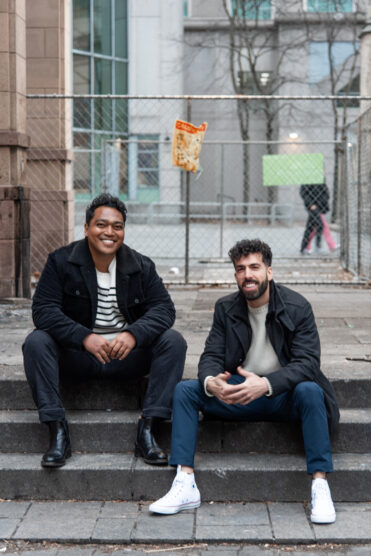Poems in Passage Makes a Welcome Return Journey in Toronto
The words of the prophets are written on the subway walls.

Public transit is a lifeline in a major city, a way to move around for those who don’t drive, those who are too young or newly arrived, and groups of visiting parents or tourists. By democratizing travel throughout the city, public transit can open up new neighbourhoods and ensure people can get to school and work.
The transit network is a chain of vehicles that connects residents. In the GTA, that network is the Toronto Transit Commission, which facilitates over 380 million journeys a year. When Latif Murji and Addesse Haile were growing up in Scarborough, the train was their transportation to school, and it was also where they found an unexpected ray of light during a morning commute: poetry.
Before 2012, the TTC had a public arts program called Poetry on the Way, with short poems on posters on all buses, trains, and streetcars. It was this program, and these poems, that left their impression on Haile and Murji. Haile says, “I remember being on the 17 bus or being on the train at Kennedy station. It was super meaningful for us to see the program. We, like every Torontonian, were kind of surprised when it disappeared.”

For many people, just recognizing that their city had something great but no longer did would have been the end of it. Cities evolve constantly, and the unfortunate trend is that the arts in general and public arts specifically are never near the top of many political agendas. Just this week, Winnipeg announced it would provide zero funding for public art in 2024, and last year the Ontario government halted more than $5 million in one-time grants for the Ontario Arts Council. This may seem routine, and many of us are detached from these decisions made in government halls and boardrooms.
The transporting poems of their youth, however, were still front and centre for Murji and Haile, and after more than a decade, they decided that if nobody else was going to bring back this program, they would do it themselves. “We were hanging out over the summer, and we were just discussing how, postpandemic, this city was a little bit more dark and dreary,” Murji says.
“We were reminiscing about the program that we both experienced as kids in Scarborough, and we thought, you know, what if we could bring this back? And so that was the impetus. We reached out to the TTC, and they were supportive. And that’s how the ball kind of got rolling.”
These conversations turned into Poems in Passage, a resurrection of the original program and an avenue to highlight the talent and diversity of Toronto poets. The next challenge was to find the poets. As an artform, poetry has lost much of the popularity it once enjoyed, with modern audiences preferring films or TV shows. The worry is that young people are no longer interested in what poetry, and by extension, poets, have to say, so young creatives seek other outlets. This fear, while realistic, proved meaningless in this instance, with Murji and Haile receiving hundreds of works when the call for submissions went out. The result is a collection of poets who represent the diversity and strength of the creative scene in Toronto. Foremost is Poems in Passage’s poet-in-residence, Britta B, an artist and poet who teaches spoken word at Seneca College.

Poems in Passage founders Addesse Haile (Left) and Dr. Latif Murji (Right)
The diversity of the work was important to Haile and Murji. Studies from the United States have shown that the transit systems in major urban areas are more frequently used by Black and Hispanic individuals as well as immigrants and residents who have lower incomes. The poems, then, had to reflect the users of the TTC and be relatable to their experience. Murji says that their “original vision of poems and passages was that we want to be elevating the voices of underrepresented artists, and that’s how we can really represent the diversity of our beautiful city. So that’s one of the core values that we were able to, I guess, execute on.”
The first batch of poems to be installed features work from a huge variety of Toronto artists, including slam poets and even a verse from Murji himself. As a practising physician and a member of an indie-band, Dr. Murji is keenly aware of the importance of the relaunched program. Studies have shown the benefits to mental health, and Poems in Passage hopes to add to this. He says, “I have a medical background, and we see this as a public-health, mental-health intervention at this population level. We know that poetry can strengthen our sense of identity. We know that it can connect us to the experiences of others and foster empathy, so it has this strong positive effect on mental health. And that’s happening to millions of people a year. So that’s, like, you know, this very cool public-health intervention. Maybe research could be done on that.”
For all the good that has come from the revitalization of the program, it is important to remember that it would not exist without two friends from Scarborough who grew up riding the train together. Of all the things, positive or negative, that they could have taken from that experience, what stuck with them long into adulthood was not the commute or the congestion or any of the characters they may have seen, but the poetry. Haile and Murji are not only the founders of this necessary public art project, they are the case study of why this it is necessary.




